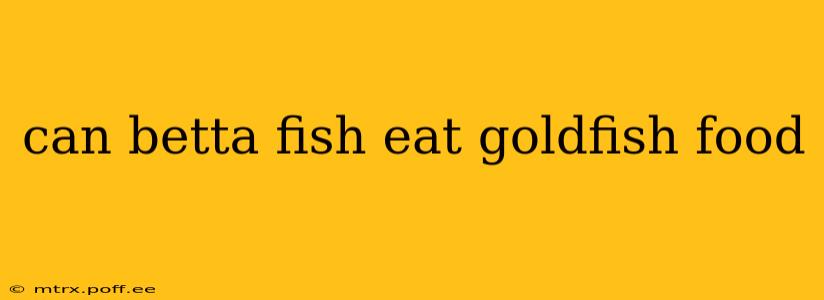Betta fish, known for their vibrant colors and flowing fins, are popular aquarium pets. Their dietary needs, however, are quite specific. So, can betta fish eat goldfish food? The short answer is: sometimes, but not ideally. While a small amount occasionally won't kill them, goldfish food isn't a suitable staple diet for bettas. Let's delve deeper into why.
What are the Nutritional Differences Between Betta and Goldfish Food?
Betta fish are carnivores, requiring a diet rich in protein to thrive. Their natural diet consists of insects, crustaceans, and other small aquatic animals. Goldfish, on the other hand, are omnivores with a more varied diet that includes algae and plant matter in addition to protein sources. This fundamental difference in dietary needs is why feeding betta fish goldfish food regularly isn't recommended.
Why Goldfish Food Isn't Ideal for Bettas
Goldfish food often lacks the essential nutrients that bettas need. It typically contains a lower protein content and a higher proportion of carbohydrates and fillers. A diet lacking sufficient protein can lead to several health problems in bettas, including:
- Poor growth and development: Bettas may fail to reach their full size or exhibit stunted growth.
- Weakened immune system: A deficient diet makes them more susceptible to infections and diseases.
- Loss of vibrant coloration: Their stunning colors may fade due to nutritional deficiencies.
What Happens if My Betta Eats Goldfish Food?
Occasional consumption of a small amount of goldfish food likely won't cause immediate harm. However, making it a regular part of their diet can lead to the health issues mentioned above. Think of it like a human eating only candy—it might be okay as a treat, but not as a primary food source.
What Should I Feed My Betta Fish?
The best food for your betta is a high-quality, commercially produced betta pellet food. These pellets are specifically formulated to meet their nutritional needs, providing the necessary proteins, vitamins, and minerals. Look for pellets that are:
- Sinking pellets: These prevent the food from floating on the surface and potentially polluting the water.
- Small in size: Bettas have relatively small mouths and can struggle to eat larger pellets.
- Free of artificial colors and preservatives: These additives can be detrimental to their health.
In addition to pellets, you can occasionally offer them small amounts of live or frozen foods like:
- Bloodworms
- Daphnia
- Brine shrimp
Always remember to feed your betta in moderation. Overfeeding can lead to water quality issues and obesity in your pet.
How Often Should I Feed My Betta?
A good rule of thumb is to feed your betta fish twice a day, offering only a small amount they can consume within a few minutes. Observe their feeding behavior and adjust the portion size accordingly. Remove any uneaten food promptly to prevent water contamination.
Can Betta Fish Eat Flake Food?
While betta pellets are generally preferred, some betta owners successfully use high-quality flake foods. Choose flakes specifically designed for bettas and ensure they are small enough for easy consumption. However, keep in mind that flakes tend to dissolve more quickly, leading to faster water contamination if uneaten.
Are There Any Specific Brands of Betta Food I Should Look For?
Several reputable brands produce high-quality betta foods. Research and read reviews to find a brand that suits your betta's needs and your budget. It's often helpful to try a few different brands to see which your betta prefers.
By following these guidelines and providing your betta with a balanced and nutritious diet, you can ensure your finned friend lives a long, healthy, and colorful life. Remember, choosing the right food is crucial for their overall well-being.
